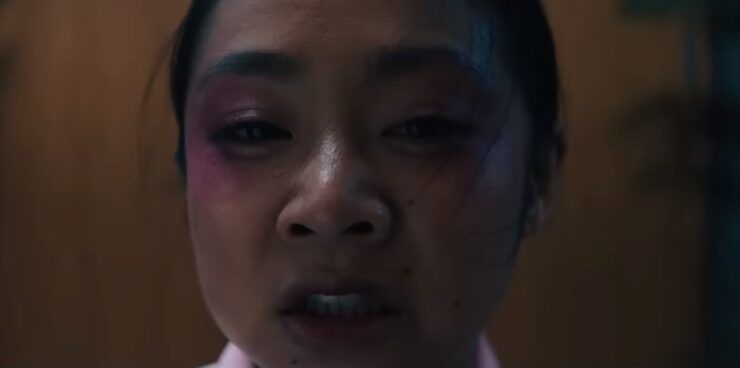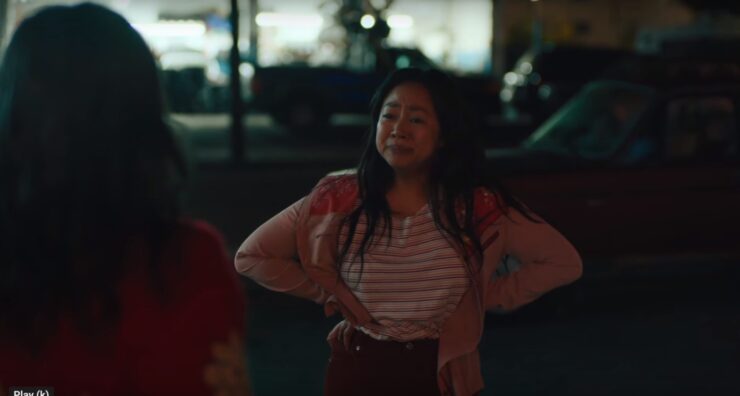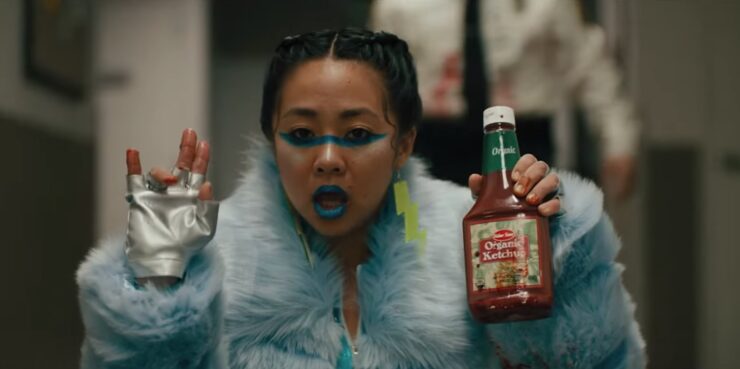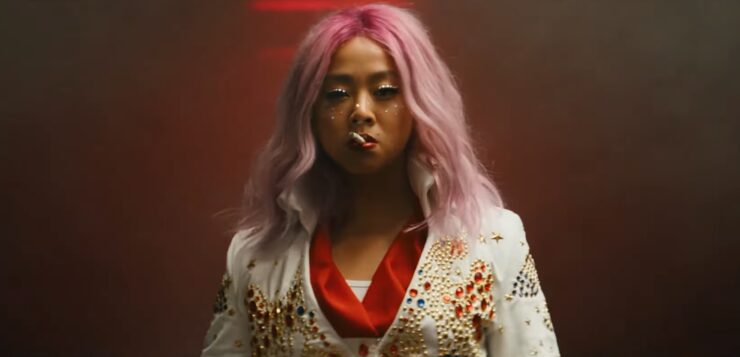To every other queer daughter of immigrant mothers who goddamn saw this coming.
To every gay kid in every universe who can feel this life making a villain of you.
Hi. I’m one of you. And this should’ve been our year.
***
It’s funny, isn’t it? This is a story about a wild, wonderful multiverse of possibilities, and we still live in the universe where a story gets made out of our specific trauma and that story swept the Oscars, winning seven out of eleven nominations—including Best Supporting Actress—but not for the queer girl at the everything bagel core of the story whose heartache broke the world.
Because this is our story. It’s our story in equal measure to Evelyn and Waymond Wang’s. The movie understands that. The Academy has decided it does not. Joy, in her rage and her depression and her love, anchors the Best Picture sweep. The best goddamn film of the year, and all the leads were recognized except her.
Queer daughters of immigrant mothers, one of our stories finally got told. We got to see our rage and our hopelessness and our love and our want and our nonbelonging. In Joy’s eyes, in the howling kinetic void of possibility that paralyzes, in the many versions of the selves who we could be, who we are not, who just maybe, our mother might actually love. You’re very lucky your mother is open to you dating a girl. Those words broke the goddamn multiverse open. That story shifted the narrative, expanded the conversation surrounding immigrant stories, swept the goddamn Oscars.
What grade do you get when your trauma drives the entire plot of the best movie of the year and everyone wins but you? A minus, B plus at best? No one has the same queer diaspora experience, but for me, like plenty of my other B pluses I know all too well it will be remembered as nothing but a failure.
Except it’s not our failure, and definitely not Stephanie Hsu’s. It’s the Academy’s. Sure, that’s a strong feeling, and sure, I shouldn’t make a habit out of exhausting myself when incredible QTPOC stories get overlooked for awards, especially when this film did sweep in other, crucial, beautiful ways. But the specificity of the situation makes me want to put the entire Academy on an everything bagel. With extra salt. To balance out the salt in the wound that makes it impossible to ignore.
That character? In that role? In this movie? It would be one thing if she’d lost to another actor in the category. But both Hsu and Curtis play supporting characters with queer storylines who change Evelyn Wang’s life. Hsu plays every version of Joy: Jobu Tupaki, daughter and monster, supervillain and depressed queer second gen kid who just wants her mom to see her. Hsu embodies the role thrillingly, flayingly well. It’s in the way she moves, the history of hurt behind her eyes. The familiar, complicated intricacy of loving your mother in all her messy truth and wishing she would just goddamn do the same for you. It’s there, that rarely told story of shame and sharp longing.
You’re very lucky your mother is open to you dating a girl.
It’s true. It is a privilege. It could be worse.
Stephanie Hsu brought Joy Wang to life.
And she lost, to Jamie Lee Curtis’s IRS agent hot dog fingers Deirdre Beaubierdre.
When Curtis was nominated for Best Supporting Actress along with Stephanie Hsu, my first thought was that if her performance of physical chaos and queer textuality opposite Michelle Yeoh beat out Stephanie Hsu’s, it would be my villain origin story.
Fine then! Make me your villain! Evelyn, I am your daughter, and your daughter is me. Every single version of Joy is Jobu Tupaki. We were never going to win. This story is built off our pain, off of how the overwhelmingly infinite possibilities of who we will never become haunt us ‘til we hurt you, because who we are in this life right here will never, in fact, be enough for you.

Message received. We are your villain. We are your redemption arc.
The thing is, Curtis’s performance was fine! She played her background role entirely sufficiently in this explicitly Asian-led movie. Just because it’s fairly public consensus the Academy should have recognized her years ago doesn’t mean they should have done it this year for this role. Deirdre Beaubierdre was never written to be an awards darling and she didn’t need to be. Empirically, Curtis brought nothing this year that Stephanie Hsu or Angela Bassett did not. It’s a smaller role, and she’s fun, effective, and successful in it. It was simply not the strongest supporting performance in the film, much less the category.
***
What a fantasy, to have a mother who would choose us over and over, even when we ruin everything. Even when our very existence embarrasses her in front of her father, threatens to distract her from taxes and her day to day. Evelyn Wang chose to try to see the fullness of her daughter.
Even then, it wasn’t perfect. That’s what made it feel close to real. But this, this is what makes it feel really real. Of course Hsu lost.
To everyone who made that call, you’re goddamn welcome, I guess. Thanks for recognizing how our story makes you feel without confronting the giant bagel in the room.
Because then maybe we’d really have to talk about what it means that the best picture of the year, certainly one of the most talked about movies, is anchored by an Asian generational diaspora queer dissonance. It’s not a clean, flat, feel-good narrative. Evelyn’s relationship to Joy and her queerness is not violent. It doesn’t manifest in broad, cruel strokes. It’s a thornier thing, tangled with familiar generational dissonance: why can’t you just accept who I am to you? This is a story of a gay Asian girl with a mother who loves her and in fact is trying very hard. And yet it is her failure to love the child she has, as she is, that traumatizes Alpha Joy so fundamentally that she breaks the multiverse and the goddamn box office.
***

“To share a piece of myself that I was so scared to share only for you to say nothing, drive away, go on with your life as if nothing happened.”
“No…it’s not like that. It’s Gong Gong. He is from a different generation.”
“You can stop hiding behind him. You should feel relieved, you don’t have to choose anymore.”
“Choose?”
“Between loving me or hating me. You can do both at the same time, now that you’re just like me.”
That simultaneity, that patchwork pastiche familiar to so many of us who fight not to succumb to becoming Jobu Tupaki. You are loved. You are not seen. You are cared for. You are not understood. It is not enough. It has to be.
***
Somehow, the predominant narrative taken away from this film is that it’s “feel good.” Mainstream media lauds its “quirky,” “wacky charms,” and “endearing goofiness,” arguing it hits “a sweet spot of benignly invigorating youthfulness.” They perceived it as “a lovable underdog,” during awards season instead of recognizing the rigorous storytelling it is, the way the film’s craft wields the absurd so intentionally. The implication being finally, a movie with immigrants and queerness that’s fun to watch. Undoubtedly this all is true and it is fun, but there’s something so dismissive and disconnected from this narrative. I’d argue that the film has been so effective because it is rooted in trauma, it’s just, well—generational. Which is to say it’s not a “stereotypical” story about a queer Asian-American daughter and her oppressive immigrant homophobic mother that an audience might expect. An entirely valid story, just not the project here—it’s one generation beyond that. Evelyn isn’t shocked by Joy’s queerness in the film, she’s not disgusted. She’s avoidant, and that’s rarer on-screen, its own familiar, nuanced, crucial truth. EEAAO explores a more complicated relationship, the distance between mother and daughter gulfed not only by queerness or American-ness or its intersection, but by their specific, fundamental, universal conflict: why can’t you just accept who I am to you? It works because it does get at the universal through the specific, something we’re always fighting to let marginalized storytellers get to create. It works because it feels current, because that dissonance and that distance can and often does coexist with love. It’s a different, intersecting power dynamic, but we see it between Evelyn and Waymond too. That, though, has been getting its critical and pop cultural due (laundry and taxes!). Meanwhile, there is a universe, the Alphaverse, in which Evelyn pushes her daughter so hard she literally cracks under the pressure. The director, the writers, the film understands Joy Wang. It’s the Academy that missed it.
So every one of us who’s ever identified with Joy Wang’s frustrated loneliness or Jobu Tupaki’s nihilistic rage is left to somehow reconcile your feel-good not-about-immigration immigrant story with the two hours of deeply personal gay diaspora trauma. This really emphasizes to me how our stories—gay Asian girl stories—are perceived by mainstream white American audiences and changemakers. In a timeline in which our story moves the world, we still don’t get to win. Or, possibly, even worse—it’s still not, somehow, our story. It’s our trauma, sure. But the Academy awarded the parents, the writing, directing and, somehow, Deirdre Beaubierdre. It feels like the Academy can’t look directly at us, at the queer daughters of Asian mothers who can’t help but see ourselves in Joy. They bear witness tangentially, recognizing the locus of storytelling she shapes, but their gaze and their praise lands anywhere but her.
We can celebrate the massive wins for representation and recognition—neither of which are, alone, going to save lives, but both of which contribute to a safer world for Asian folks—while also recognizing the slap in the face of who lost, and to whom. EEAAO even took the category. We were wrung out, retraumatized, and embraced by this movie, only to watch everyone else take the prize. The Shire was saved, but not for us.
***
What would it have meant if Stephanie Hsu had won?
What would it have shifted in this timeline, in this universe?
Yes, Hollywood awards and mainstream representation recognition are inherently incomplete and fallible. Yes, maybe no one would have cared too much, a tertiary celebration to the other leads getting their deserved due, just another of many shiny statues in the sweep.
But it would have mattered to me.
To other queer daughters of immigrant mothers. To every queer diaspora kid who has heard “he’s from a different generation” and knows it means “I don’t want my father to judge me” and, worse, “I have chosen not to advocate for you, please honor it.” To every queer diaspora kid who knows all too well that yes, they are lucky, yes, they could have it worse. To every daughter who has seen every single possibility for her future and would rather burn the world than live it. To any diaspora kid, loved and cared for and not quite seen, who’s heard “you are getting fat” at the beginning of what turns out to be a reconciliation. Guilt-trip tangling with the messy truth of love, expressed in a thousand tiny ways that say “you are mine,” in all the possessive, beautiful, suffocating power that that encompasses, the implicit “and you will behave as such” as loud and present as the end of the world.
So you know what I say to an Academy that awards everyone in this story except for Joy Wang? We are not your morality lesson. We are not your villain. You are ours.
Let me write my own thank you to Stephanie Hsu, through this letter, to every other person in our slice of the multiverse who knows she, and we, deserve better.
This is a movie about, among other things (everything, everywhere. all at once), queer pain. Not being seen, not being recognized, feeling like the version of yourself most incongruent with every single reality you’ve ever been in and never, ever being enough.

You are enough. In all your rage and untidy endings, questionable morality and enormous, powerful heart. You are enough in every single universe.
No, we are not your villain.
Joy Wang is my hero.
If she’s yours too, I love you. I see you. I see your complicated relationship to this movie, and your parents’ reaction to it. Fuck the Academy. Fuck the audiences who don’t get it. We deserve better. We didn’t get it this time. But we have each other, and we know, unequivocally, that Joy Wang’s story shifted the world.
I can’t just stick a googly eye on the whole thing and let it go. It matters that she lost. It matters who she lost to. But it also matters that Stephanie Hsu delivered a performance so spot-on exquisite that it did anchor a film this transformative and game-changing, one that has hopefully flung open so many more doors, a performance so personal and affecting I am out here caring about the goddamn Oscars enough to write about it. I just need to witness that simultaneity, to voice what it feels like to be genuinely thrilled for what this movie did win while also unable to ignore what it didn’t. It matters that this complex, brilliant, fresh yet familiar story is about the ache and rage and love and power of a queer Asian-American girl, and the ways in which her mother’s miscommunicated care broke her family, and the multiverse. It matters that we got to hear Joy Wang tell her mother to stop using Gong-Gong as an excuse, and fuck, it matters that Evelyn does. It matters that this is a story about loving each other through dissonance and disconnect. It matters that the three of them bond over karaoke even after one of them nearly broke the universe (awkward). It matters that we, the Jobu Tupakis of this universe, know that Becky, you need to grow your hair means thank you for loving my daughter and it matters that we know it’s fucked up that that’s supposed to be enough, and yet that in some ways, it is.
“When I choose to see the good side of things, I’m not being naive. It is strategic and necessary. It’s how I’ve learned to survive through everything.”
After all, I’m my father’s daughter too.
Maya Gittelman is a queer Fil-Am and Jewish writer and poet. They have a short story forthcoming in the YA anthology Night of the Living Queers (Wednesday Books, 2023). She works in independent publishing, and is currently at work on a novel. Find them on Twitter (@mayagittelman) or Instagram (@bookshelfbymaya).










